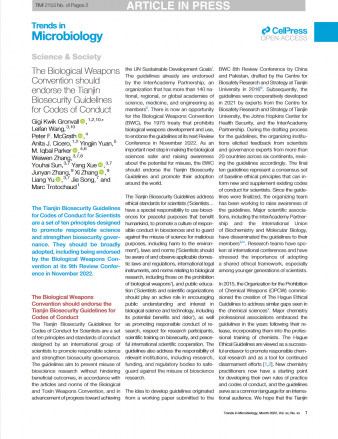The Tianjin Biosecurity Guidelines for Codes of Conduct for Scientists are a set of ten principles and standards of conduct designed by an international group of scientists to promote responsible science and strengthen biosecurity governance. The guidelines aim to prevent misuse of bioscience research without hindering beneficial outcomes, in accordance with the articles and norms of the Biological and Toxin Weapons Convention, and in advancement of progress toward achieving the UN Sustainable Development Goalsi. The guidelines already are endorsed by the InterAcademy Partnership, an organization that has more than 140 national, regional, or global academies of science, medicine, and engineering as membersii. There is now an opportunity for the Biological Weapons Convention (BWC), the 1975 treaty that prohibits biological weapons development and use, to endorse the guidelines at its next Review Conference in November 2022. As an important next step in making the biological sciences safer and raising awareness about the potential for misuse, the BWC should endorse the Tianjin Biosecurity Guidelines and promote their adoption around the world.
The Tianjin Biosecurity Guidelines address ethical standards for scientists (‘Scientists…have a special responsibility to use biosciences for peaceful purposes that benefit humankind, to promote a culture of responsible conduct in biosciences and to guard against the misuse of science for malicious purposes, including harm to the environment’), laws and norms (‘Scientists should be aware of and observe applicable domestic laws and regulations, international legal instruments, and norms relating to biological research, including those on the prohibition of biological weapons’), and public education (‘Scientists and scientific organizations should play an active role in encouraging public understanding and interest in biological science and technology, including its potential benefits and risks’), as well as promoting responsible conduct of research, respect for research participants, scientific training on biosecurity, and peaceful international scientific cooperation. The guidelines also address the responsibility of relevant institutions, including research, funding, and regulatory bodies to safeguard against the misuse of bioscience research.
The idea to develop guidelines originated from a working paper submitted to the BWC 8th Review Conference by China and Pakistan, drafted by the Centre for Biosafety Research and Strategy at Tianjin University in 2016iii. Subsequently, the guidelines were cooperatively developed in 2021 by experts from the Centre for Biosafety Research and Strategy of Tianjin University, the Johns Hopkins Center for Health Security, and the InterAcademy Partnership. During the drafting process for the guidelines, the organizing institutions elicited feedback from scientists and governance experts from more than 20 countries across six continents, revising the guidelines accordingly. The final ten guidelines represent a consensus set of baseline ethical principles that can inform new and supplement existing codes of conduct for scientists. Since the guidelines were finalized, the organizing team has been working to raise awareness of the guidelines. Major scientific associations, including the InterAcademy Partnership and the International Union of Biochemistry and Molecular Biology, have disseminated the guidelines to their membersii,iv. Research teams have spoken at international conferences and have stressed the importance of adopting a shared ethical framework, especially among younger generations of scientists.
In 2015, the Organization for the Prohibition of Chemical Weapons (OPCW) commissioned the creation of The Hague Ethical Guidelines to address similar gaps seen in the chemical sciencesv. Major chemistry professional associations embraced the guidelines in the years following their release, incorporating them into the professional training of chemists. The Hague Ethical Guidelines are viewed as a successful endeavor to promote responsible chemical research and as a tool for continued disarmament efforts [1,2]. New chemistry practitioners now have a starting point for developing their own rules of practice and codes of conduct, and the guidelines serve as a common language for an international audience. We hope that the Tianjin Biosecurity Guidelines can have a similar influence in the bioscience sector.
One factor that led to the success of The Hague Ethical Guidelines was their support from the OPCW, the implementing body for the Chemical Weapons Convention. Similar support is needed for the Tianjin Biosecurity Guidelines by the BWC, the nations that are party to the treaty, and the Implement Support Unit for the BWC. There is precedent for this, as there have been efforts over the past 10 years to introduce a set of ethical guidelines into the BWC. During the 6th Review Conference in 2006, the governing body recognized that codes of conduct for ethical research represent an increasingly important tool for States Parties within the BWC. China and Pakistan proposed to develop a code of conduct for biological scientists to the BWC 8th Review Conference in the working paper as noted in the preceding text. The Chinese and Pakistani delegations continued to support the Tianjin Biosecurity Guidelinesvi. In their most recent submission, the leading delegations requested that the BWC endorse the Tianjin Biosecurity Guidelines during the 9th Review Conference, set to take place in November 2022. In addition to this endorsement, they urged States Parties and relevant stakeholders to voluntarily integrate the guidelines into their practices, and develop and implement guidelines-based education for scientistsvi.
Ultimately, scientists around the world and the institutions that support them should be aware of the Tianjin Biosecurity Guidelines and adhere to their message: the biological sciences should not be misused for harm, and they should take a meaningful role in biosecurity governance for all. An important step in this global endeavor is for the BWC to endorse the Tianjin Biosecurity Guidelines at the 9th Review Conference. In doing so, the disarmament treaty will be supporting a set of internationally sourced and supported guidelines that can act as common ground for the role of scientists in the compliance of the BWC from States Parties and the global biological sciences community.
